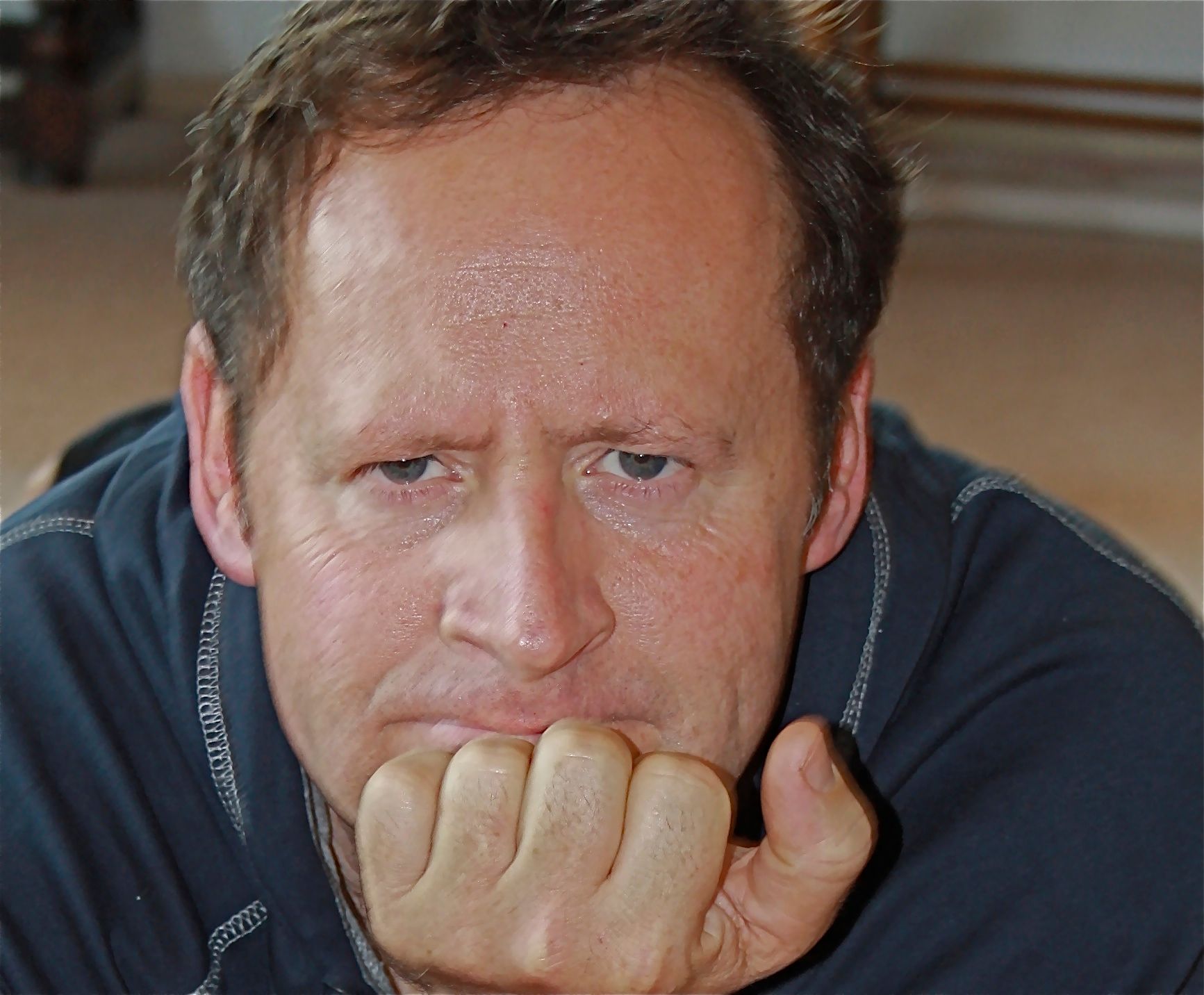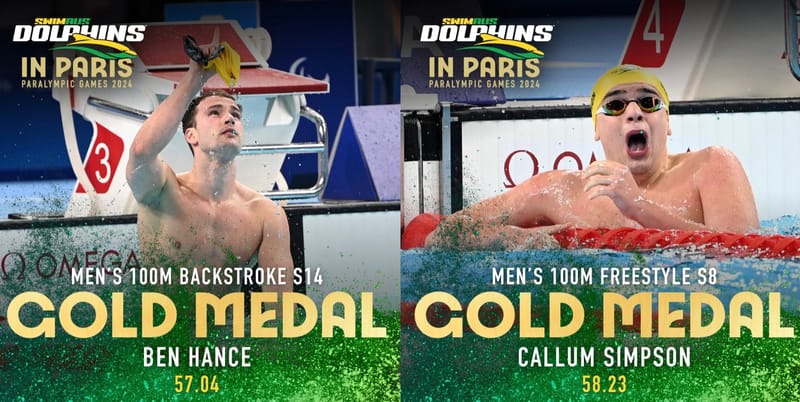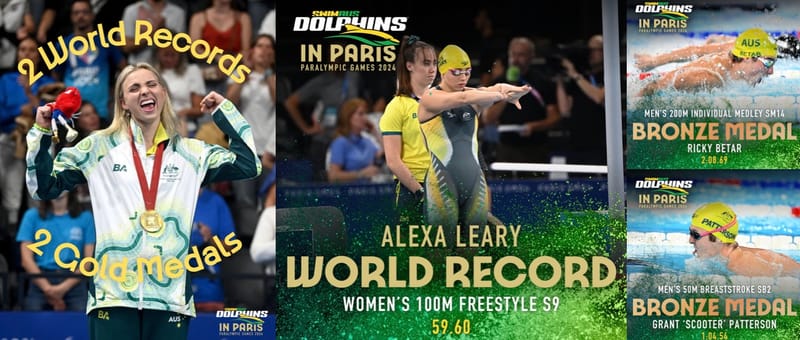Brits Redfern & Tai Triumph, Victory Takes Canadian Rivard Career Tally to 13 Medals & Aussie Hodge Gets The Gold He Wanted
On Day 8 in Paris, Rebecca Redfern and Alice Tai add to Britain's gold count; Canada's Aurélie Rivard wins at a third straight Games; and Tim Hodge takes his debut Paralympic title

Lead report by Joshua Murray for ParalympicsGB and Aquatics GB; followed by reports from Swimming Australia and Swimming Canada, with thanks.
Rebecca Redfern called it "surreal" and Alice Tai was "in shock" after they claimed a gold apiece for ParalympicsGB on day 8 of 10 in the Paris pool, 13-year-old Iona Winnifrith adding to the party with a silver to ensure she will be the British team's youngest medallist at the Games.
Redfern secured the first Paralympic title of her career in the SB13 100m Breaststroke, and Tai then sprinted to her second gold of the Games - and fourth medal in Paris - for gold in the S8 50m Freestyle to add to her growing haul of podium prizes in Paris.
Day 8 also saw Canada's Aurélie Rivard take gold for the third straight Paralympic Games. Rivard completed a three-peat of the women’s 400-m freestyle S10, a title she first captured at the Rio 2016 Games, then defended in world record time three years ago in Tokyo. Rivard's career total now stands at 13 medals (6 gold, 4 silver, 3 bronze), bolstered by bronze in the 50 free on Day 1, followed by silver in the 100 on Monday this week:
GOLD FOR CANADA 🇨🇦
— Devin Heroux (@Devin_Heroux) September 5, 2024
RIVARD’S 13TH PARALYMPIC MEDAL
Aurelie Rivard just keeps winning medals. Back-to-back-to-back champion in the women’s 400m S10. Her third medal of these Games.
Canada now has 19 medals in Paris — 10 of them in the pool. pic.twitter.com/o53wXHG6a2
And for Australia, Tim Hodge claimed the gold he really wanted – the men's 200m individual medley SM9, his maiden individual Paralympic gold – his second gold at La Defense Arena after relay success earlier in the meet.
Brit Bull Run Continues Apace In Paris Pool
Redfern's breaststroke triumph followed on from silvers in the same event in both Rio and Tokyo - and her ambition was clear from the off, moving into the lead by around 30m and building a sizeable advantage at the turn.
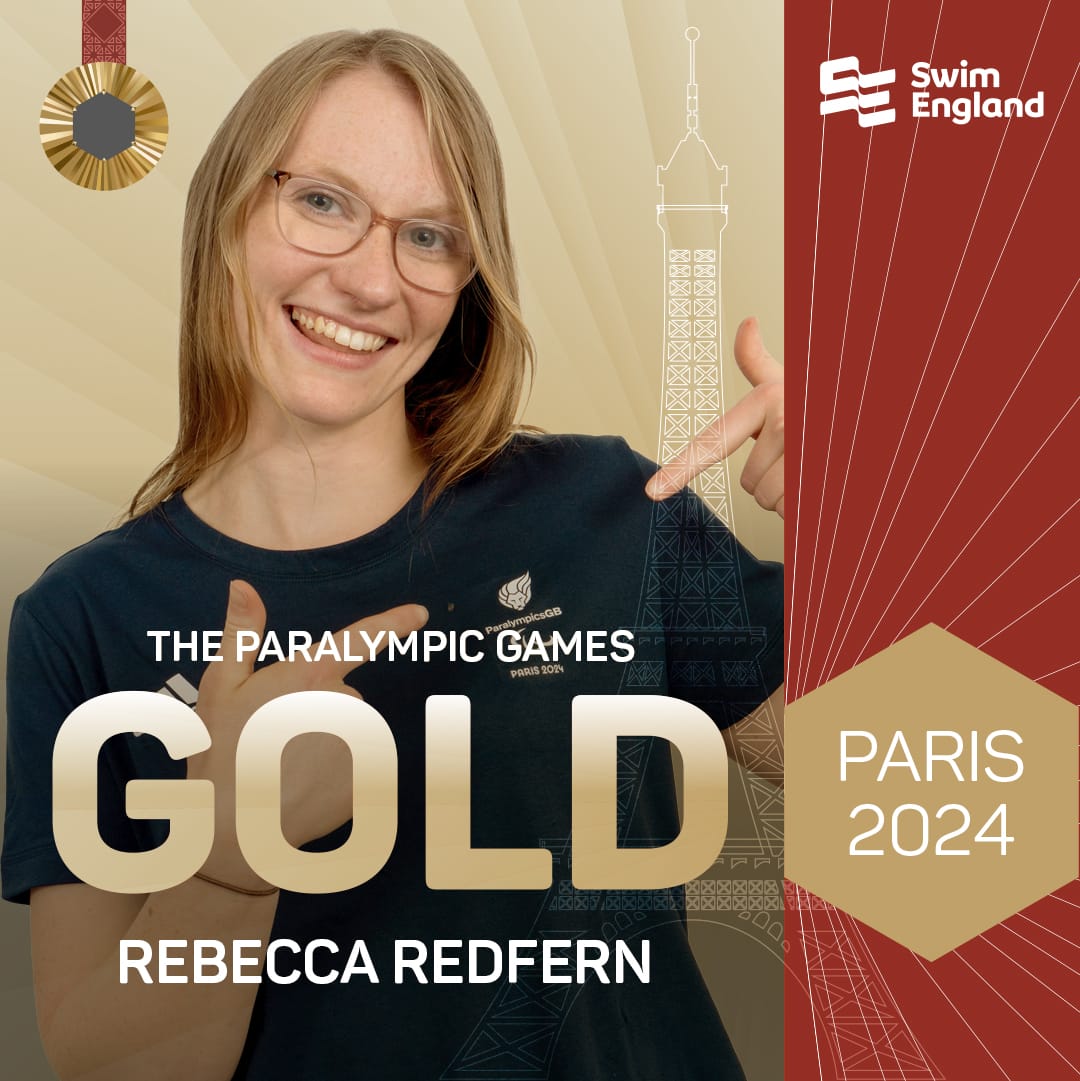
While USA competitor Olivia Chambers clawed back some ground off the wall and in the opening strokes of the second lap, Rebecca's superior stroke rate soon saw her building a lead again - and she held that all the way to the finish, to clinch a glorious gold in front of a raucous crowd that included her young son, Patrick.
"It feels really surreal. I was half-expecting somebody to come out of lane one and beat me! A gold medal is amazing, it's crazy. Two silvers in my first two Paralympics and now a gold, it means a lot," she said when reflecting on the moment.
"We've had a hell of a journey to get here. No-one could've predicted me being here and to be standing on top of the podium, it's amazing. I love all aspects of my life - my teaching, my swimming and obviously my son and my family. I do what I do because I enjoy it, and it's so much fun racing with those girls.
"This crowd has been amazing, they've really spurred me on. I couldn't hear them but I knew they were cheering, and I know my family is somewhere here, so to know they here is really special."
Rebecca's medal ceremony would not be the only one on the night to feature the British national anthem, as the in-form Alice Tai delivered in a thrilling splash-and-dash contest.
Taking lane four as the fastest seed into the Women's S8 50m Freestyle final, Alice Tai - who has seen the effectiveness of her dive impacted since her amputation - had ground to make up after 15m, but was quickly level with the three athletes in the lanes above her as her pacey stroke rate came into play.
By 35m, she was ahead, and the lead grew with every single stroke, keeping Brazilian Cecilia Jeronimo de Araujo at bay to the finish to dip under 30 seconds, her winning time of 29.91 a post-amputation personal best. And it was the time rather than the result itself that genuinely seemed to take Tai by surprise.
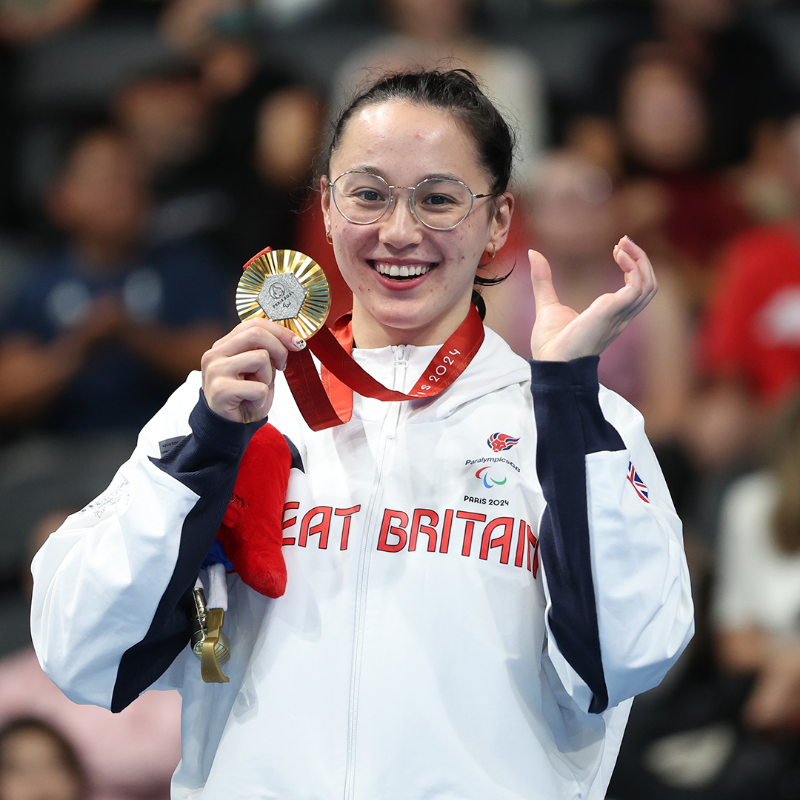
She said:
"I knew it was going to be close going in. I thought maybe someone would duck under 30s - I didn't think it'd be me! That was 0.6s off my post-amputation PB, that's a huge PB. I can't believe it, I'm still processing it! The 50m Freestyle is always such a close race, I could see her next to me and I was thinking, 'just a little bit more, just a little bit further!' I think I'm more shocked that I went sub-30s, what?!
"It [four medals from four events] is more than I expected. Every single swim has been a PB since my amputation, I'm getting so close to my old times. The 50m Free is the hardest, my dive has been pretty affected since the amputation so I didn't think I'd be getting back down to sub-30 for another year or so, it's still pretty new and I'm figuring it out. I couldn't be happier with the outcome. I've got the full set, and an extra gold, which is pretty cool - and another race to go. I'm going to have a day off tomorrow!"
Winnifrith at 13
Thirteen-year-old Iona Winnifrith became the youngest British Paralympic swimming medallist since Abby Kane eight years ago as she surged to silver in the Women's SB7 100m Breaststroke.
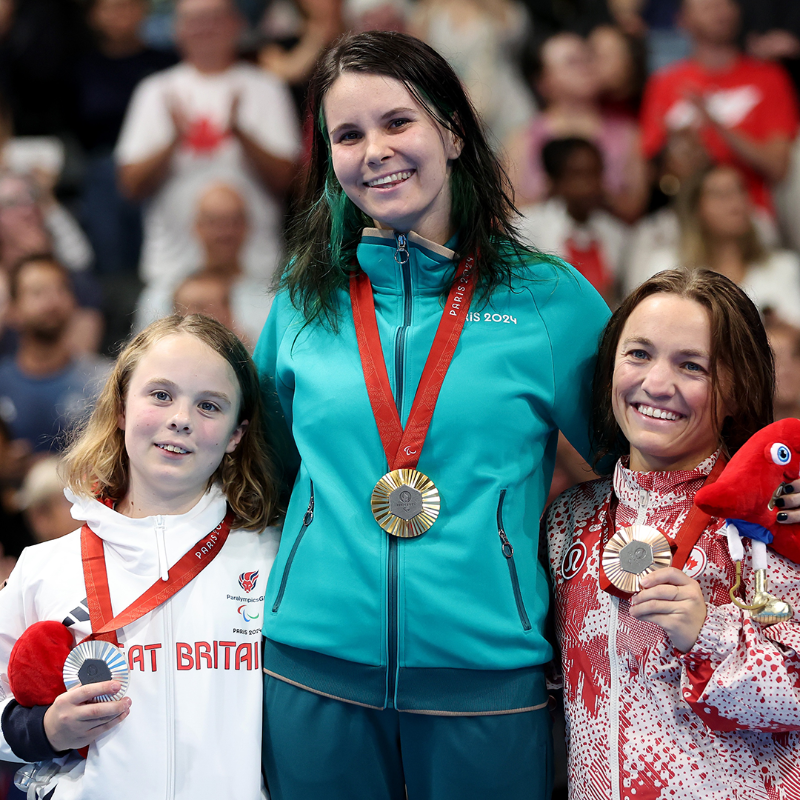
Opening up the night for ParalympicsGB was a record-breaking moment for the class of 2024. Winnifrith had not even been born when Ellie Simmonds won two gold medals at Beijing 2008 - but 16 years on, 13-year-old Iona put together a brilliant swim in the SB7 100m Breaststroke, moving clear of the chasing pack to hold second place all the way and secure a silver medal that ensures the youngest athlete on the entire ParalympicsGB team will return home with silverware to her name.
The Tonbridge swimmer said:
"It's very cool. I was really excited going into the race and I'm really happy. I knew I just needed to fight and power off from the start. I really wanted that gold, but I'm year 13 years old, you can't have everything - I'm super, super happy with that performance, I'm really proud.
"My schoolfriends will be like 'it's mad, it's very cool'. They'll be so proud of me, so many people have gone on this journey with me, my teachers have always believed in me so they'll all be happy."
Toni Shaw came agonisingly close to the podium in the Women's SM9 200m Individual Medley, a storming freestyle finish seeing her place fourth in a season's best time.
The University of Aberdeen swimmer - who has also registered top-eight finishes in the S8 100m and 400m Freestyle finals earlier in the week - was two-and-a-half seconds back from the medal positions after 150m and the breaststroke leg of this one, only to turn on the afterburners and claw back the bulk of the advantage from Anastasiya Dmytriv, ultimately just missing out on the podium.
Scarlett Humphrey contested her fifth final at her maiden Paralympic Games, placing sixth in the SB11 100m Breaststroke finale, while Faye Rogers - champion in the S10 100m Butterfly - was fifth in a highly-competitive S10 400m Freestyle contest.
Earlier in the day, Matthew Redfern - who would watch his sister become a Paralympic champion a few hours earlier - just missed out on the final of the Men's SB13 100m Breaststroke after placing 13th.
Rivard three-peats as 400 free champ, Routliffe returns to podium
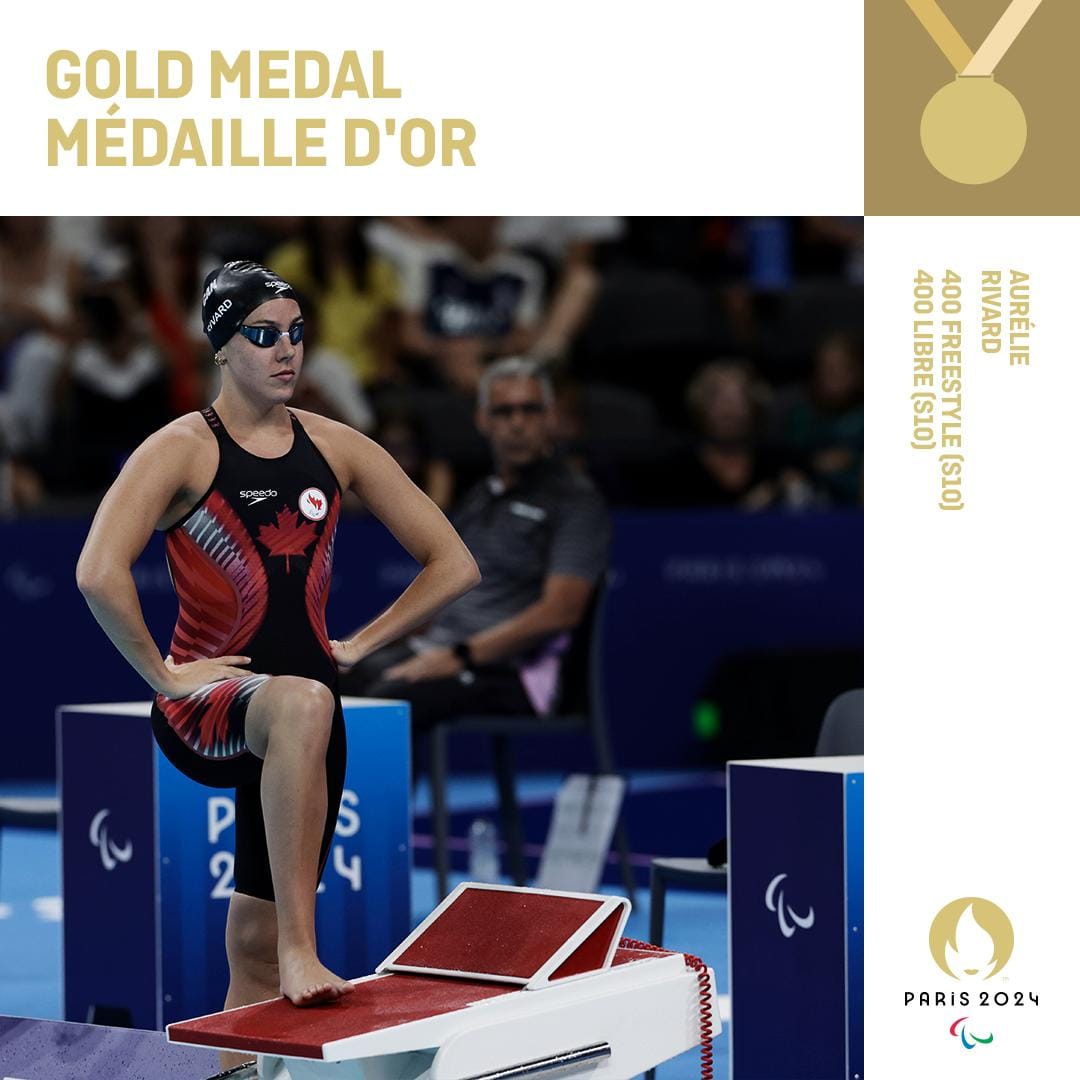
Aurélie Rivard stepped to the top of the podium for the third straight Paralympic Games, and Tess Routliffe added a bronze medal for Canada Thursday in Paris.
Rivard completed a three-peat of the women’s 400-m freestyle S10, a title she first captured at the Rio 2016 Games, then defended in world record time three years ago in Tokyo. Meanwhile, her longtime teammate Routliffe earned bronze in the women’s 100-m breaststroke SB7.
Rivard won in a time of 4:29.20, leaving the second and third steps of the podium to Alexandra Truwit of Team USA (4:31.39) and Bianka Pap of Hungary (4:35.63.) She sat third at the halfway point, but overtook first Pap, then Truwit, pulling in front at the 300-m mark then extending her lead over the final two laps.
“When I flipped at the 300-metre mark it was just about bringing it home. I worked on this so many times in training, always no matter what finishing strong, every single set, every single day. I just did what I knew. That’s what I trained for,” said Rivard, who trains with coach Marc-André Pelletier at Club de Natation Région de Québec. The 28-year-old swimmer from St-Jean-sur-Richelieu, said:
“I saw the light on the block with the No. 1 and think I lost 50 pounds of pressure and stress. My biggest fear before the race was to let the other girls make me lose my concentration because they were going to be ahead. I still had a lot of energy when I flipped at the 200. It was all about building up and slowly bringing my legs into the equation. The other girls have much stronger upper bodies than me, so I’m like, what can I bring to the table? Legs. It did hurt physically but I remember I took one breath and I saw I was ahead of one American girl next to me and it gave me the extra boost of energy that I needed.”
Her career total now stands at 13 medals (6 gold, 4 silver, 3 bronze), bolstered by bronze in the 50 free on Day 1, followed by silver in the 100 on Monday. She wasn’t satisfied with less than gold, however, and called dealing with those mixed feelings in preparation for the 400 “honestly the hardest mental challenge so far in my life probably.”
“There’s nothing wrong with silver and bronze but to me the performance that I gave was disappointing. It was not what I expected out of my preparation. I have high expectations of myself time-wise. I wanted the gold in both events so to me it was a disappointment,” Rivard said.
“The biggest challenge I had and also what I wanted after the 100 free was to not let those two performances define the rest of my meet but also the preparation that I put into this meet. The 400 is my event. It’s what I trained for and I didn’t want to be beaten in advance because it didn’t go the way I wanted in the beginning of the week.
“I think that’s what makes me the most proud right now to come out with the gold. It wasn’t a perfect race and I’m OK with that. I kind of let go of that idea of how things had to perfect because they don’t at the end of the day.”
The last Canadian swimmer to win gold at three straight Paralympic Games, and also the last to win the same event at three straight Games, is Stephanie Dixon, crowned in the 100 backstroke S9 in 2000, 2004 and 2008.
Rivard relished her moment on the podium as O Canada played in Paris La Défense Arena.
“I kept catching the eyes of my parents on the side and was like ‘don’t look, don’t look, don’t look,’ because I knew it was going to make me cry. I was really just trying to stay in the moment, enjoying being on the highest step,” she said. “This one is extra special. It’s one thing to be young and chase a gold medal, but to defend a title is harder each time. It’s hard to find little ways to beat yourself and I’m not easy to beat, I know all my tricks. You also have to beat your own expectations which is probably the hardest part, the pressure I was putting on myself. I know everything I put into this race the last few days and the last few years.”
In the first race of the session, Routliffe got Canada started with a third-place finish. Her time of 1:31.58 was good for third in the women’s 100-m breaststroke SB7, behind neutral Paralympic athlete Mariia Pavlova (1:26.09) and Great Britain’s Iona Winnifrith (1:29.69).
Routliffe, the reigning two-time world champion in the event, placed fourth in her only previous Paralympic appearance, at Rio 2016. She now has three career Paralympic medals, after earning her second silver in the 200 IM on Saturday.
“I’m here to race and that’s exactly what I’m doing. I’m super happy to be here, I love getting in the pool and competing and racing the person next to me. I’m just happy I’m getting the chance to do that again,” said the 25-year-old, who trains at the High Performance Centre – Quebec in Montreal with coach Simon Deguire.
Routliffe also had multiple family members in the crowd, including her sister Erin Routliffe, a pro tennis player who flew in directly from competing at the U.S. Open in New York.
“It’s been eight years since I’ve been at a Games and there was a speedbump in the middle of that so it’s an even better feeling,” said Routliffe, who missed the Tokyo Games due to a severe back injury. “I’m definitely emotional just about being here and getting to race again. I think it’s just reminded me how much I love the sport.”
Canada’s other finalist Thursday was Mary Jibb, who finished seventh in the women’s 200 individual medley SM9. Her time of 2:41.70 was her second personal best of the day after qualifying fifth in 2:41.99
“Tonight I wasn’t really expecting to be in a final,” said the 17-year-old Games rookie, who also set a personal best to finish fifth in the 100 backstroke Tuesday. “I was seeded 10th and I was going into finals fifth so that was a big shocker. I’m super happy with getting a second chance to race and dropping my best time.”
“I try to go PBs every single time I’m in the pool. If it happens, wonderful, but if it doesn’t I don’t get too down on myself because I learn from every experience that I get to race,” said Jibb, who is coached by Heather Lee at the Muskoka Aquatic Club.
Hodge Grants Dolphins Fourth Gold In Paris
From Swimming Australia
How did Tim Hodge make the impossible possible?
By doing the stuff “that people either can't do or won't do, and you've got to do it day in and day out to stay on top.”
Hodge claimed the one he really wanted at the 2024 Paris Olympics – the men's 200m individual medley SM9, his maiden individual Paralympic gold – his second gold at La Defense Arena.
The 23-year-old led from start to finish to claim gold in a Paralympic record of 2.13:31, breaking the previous mark set by Australian Matthew Cowdrey at Beijing in 2008.
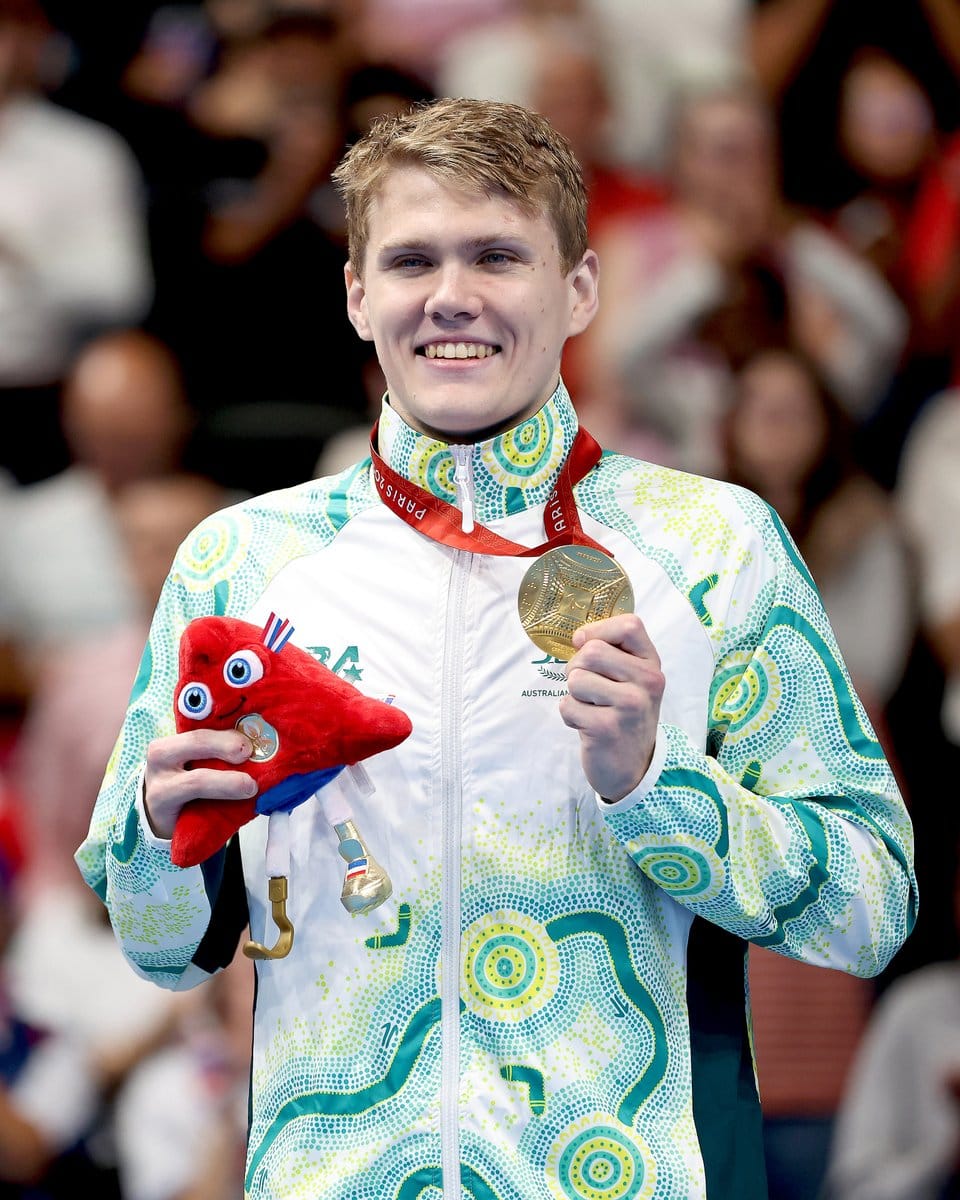
Hodge went into the race as world champion and world record holder and described how his training had to be "impossible" to win the Paralympic gold.
"The hard thing with being world champion, world record holder, is that you've got no one to chase," he told the Nine Network.
"So everything you've got to do to improve is stuff that people have never done before. You've got to do stuff that people either can't do or won't do, and you've got to do it day in and day out to stay on top. So my coach and I have been working really hard at making sure that we do the impossible to make sure that when it comes to this stage, the impossible becomes possible.”
Hodge’s gold saw Advance Australia Fair ring out for a fourth time and finally completed his pool room collection.
The busiest Dolphin in Paris has had to wait until day eight of his stacked program for the chance to turn his dream, winning Paralympic gold in the 200 IM, a reality.
“Really still a pinch me moment, me and my coach have worked so hard for this, (and with) six races leading up to this the best way to take it was one race at a time,” said Hodge.
Hodge, born without the fibula bone in his lower right leg, extended his lead by body lengths in the breaststroke leg – the notoriously most difficult leg of an IM to stand atop of the podium in Paris for a second time. He swam the breaststroke leg in the winning mixed medley 34pt relay team on day five.
Host country France completed the podium Ugo Didier second (2:15.98) and Hector Denayer claiming the bronze from lane eight (2:17.34).
In other finals:
After setting a PB and Oceania record in the heats, Jenna Jones went back-to-back in the final. Jones clocked a 1:22.04 in the women’s 100m breaststroke SB12 in another personal best swim that reset her Oceania record.
“I may not of gotten a medal but that (a PB) is so much better for me, after the year I’ve had it’s so much better to be finally getting somewhere,” said Jones.
“After months of rehab I haven’t been able to train properly for the whole year, it’s taken a mental toll, especially coming off my best year last year… but I have no words, I definitely couldn’t do this without the team around me … I’m stoked.”
Lakeisha ‘Lucky’ Patterson completed her Paris campaign with a fifth in the women’s 200m individual medley SM9 (2:39.99).
For full results, see here.
What do the classifications mean?
- S1-S10 for athletes with physical impairments.
- S11-S13 for athletes with visual impairments.
- S14 for athletes with intellectual disabilities.
Classifications explained in full here.
